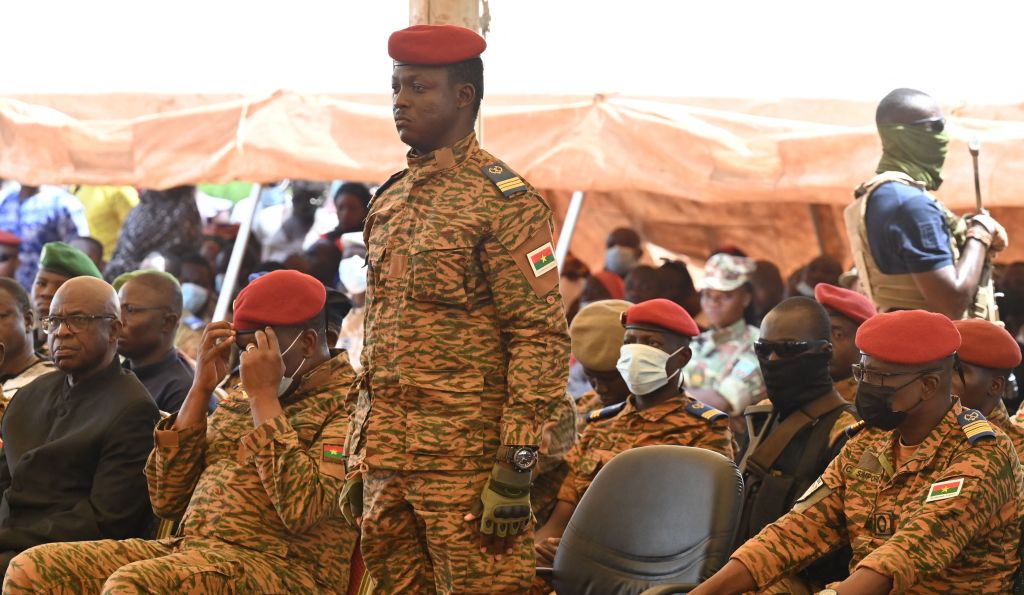In Burkina Faso, Violence Spirals out of Control
ADF STAFF
More than 4,200 people in Burkina Faso were killed by armed violence in 2022.
In the first 3 1/2 months of 2023, armed violence in the country, fueled by insurgents such as al-Qaida and the Islamic State group, claimed about 3,000 more lives, according to Armed Conflict Location & Event Data Project, or ACLED.
One 12-year-old Burkinabé girl mourned the death of a neighbor killed in a recent extremist attack on her village.
“The jihadists killed our neighbor,” she told The Economist. “His children were my friends.”
At the girl’s school, students routinely participate in drills meant to prepare for a terrorist attack. They shut windows, lock doors and silently hide under their desks.
At least she has a school to attend.
Because of rampant terrorist attacks, about 200 Burkinabé schools close every month. In the far northern Sahel region, nearly 90% of the schools are closed. As The Economist reported, the extremist insurgency also blocks major trade routes and towns, leaving about 800,000 people under constant threat. The blockades also hinder badly needed humanitarian aid.
Armed violence in Burkina Faso has killed more than 12,000 civilians and soldiers, and displaced about 2 million people since 2015, when extremist groups infiltrated the country, primarily from Mali.
Unlawful killings of civilians by violent extremist organizations and Burkinabé security forces have spiked since 2022, when the country experienced two military coups. In late April, assailants wearing Burkinabé military attire massacred at least 156 people, including newborn babies, in Karma, a village in the northern Yatenga province.
The government, led by 35-year-old Capt. Ibrahim Traoré, controls about 40% of the country. Traoré’s response to the ongoing violence is more violence, or as he put it, “total war.”
In April, two months after Traoré ordered French troops to leave the country, the government declared a “general mobilization” of civilians to “give the state all the necessary means” to deal with terrorist attacks.
“It is a constitutional framework, more power, more authority, to create, organize and direct the means to face the danger,” Burkinabé Director of Military Justice Francois Yameogo told Africanews. “In this case for us, [it is] the terrorists’ danger.”
Citing the International Covenant of Civil and Political Rights, of which Burkina Faso is a member, Yameogo added that “in the event of exceptional danger or threat to the existence of a nation, the state may take measures required by the situation.”
The government also issued an advisory that gives Traoré “the right to requisition people, goods and services and the right to restrain certain civil liberties,” Africanews reported.
Since gaining power, Traoré has been accused of encouraging ethnic profiling as most recent victims of arbitrary arrest and extrajudicial killings have been Fulani, Chrysogone Zougmoré, the head of Burkinabé Human and Peoples’ Rights Movement, told The Economist.
Analysts worry that Traoré’s move to arm thousands of mostly non-Fulani militiamen may lead to more ethnic polarization and violence.
“People are not afraid to say to my face, we are going to kill you,” Hassan Diallo, a Fulani researcher in Ouagadougou, told The Economist.
Diallo said he worried that the country could be on a path toward genocide.
As part of his efforts to rally all Burkinabé in the fight against terrorism, Traoré launched a campaign to recruit 50,000 civilians into the Volunteers for the Defense of the Homeland (VDP) shortly after gaining power in September 2022. By November, the government claimed it had recruited 90,000.
The chosen civilians underwent two weeks of military training.
A recent attack underscored the danger of sending lightly trained civilians to the frontline battlegrounds of Burkina Faso.
Terrorists attacked a group of soldiers and civilian volunteers near Aorema village on April 15, killing 34 VDP members, six soldiers and injuring 33 more, according to a statement from local authorities.
A report by the Institute for Security Studies (ISS) argued that a monitoring mechanism is needed to collect data on VDP actions and assess their effectiveness. The ISS researchers worried that the move to arm civilians could backfire.
“Burkina Faso might be faced with thousands of uncontrolled armed civilians, which would worsen insecurity,” the report said.


Comments are closed.